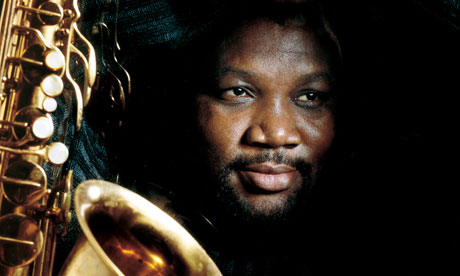
Zim Ngqawana worked with Hugh Masekela
The South African saxophonist Zim Ngqawana has died aged 51 after suffering a stroke during a rehearsal. Ngqawana's debut studio album, San Song (1996), introduced his measured yet free-spirited style of music, which sought to break down barriers between South Africa's jazz dialect and that of his predecessors in the African diaspora.
The Blue Notes, Bheki Mseleku, Johnny Dyani and Louis Moholo, among others, had laid the foundation for Ngqawana. He kept the soul of his music rooted in indigenous sounds, yet also incorporated progressive phrasing and cadences to attain universal relevance.
Born in Port Elizabeth, Ngqawana was the youngest in a family with five children. He began playing the flute at the age of 21 and started his formal music education at Rhodes University, Grahamstown. In the mid-1980s, he enrolled at the University of Natal in Durban for the jazz studies diploma that Darius Brubeck had recently established (the first of its kind in South Africa).
As a member of the university band led by Brubeck, the Jazzanians, Ngqawana performed at a jazz educators' convention in the US in 1988. This was the beginning of his international exposure. He then studied with Max Roach and Wynton Marsalis and attended the University of Massachusetts on a musical scholarship, studying and performing with the musicians Archie Shepp and Yusef Lateef. Ngqawana was immensely moved by the jazz and spiritual philosophy of the multi-instrumental Lateef, who had converted to the Indian Ahmadiyya religion. Ngqawana played several instruments himself, including the piano and woodwinds.
Another influence was the South African jazz pianist Abdullah Ibrahim with whom he performed in the early 1990s. At around that time, Ngqawana moved to Johannesburg, where there were opportunities to work with a new crop of jazz musicians as well as elder statesmen such as the trumpeter Hugh Masekela. In between jamming at local venues and composing music for cutting-edge dance companies, he also began to visit Europe and North America with his group, Ingoma. In 1994 he directed a 100-piece ensemble, the Drums for Peace Orchestra, at the inauguration of President Nelson Mandela in Pretoria.
Ngqawana's 2003 album Vadzimu offered South Africa's rich kaleidoscope of traditional and ritualistic mantras as a balm for the soul. The album also showcased rising stars in the South African jazz revolution, including the pianist Andile Yenana, the double-bass player Herbie Tsoalei and the trumpeter Marcus Wyatt.
In 2004, Ngqawana and Brubeck were commissioned by the Lincoln Center Jazz Orchestra in New York to produce a work that became known as Let Freedom Swing, for the orchestra's celebration of human rights and social justice. In 2007, he released a live album recorded at Bird's Eye jazz club in Basel, Switzerland.
Ngqawana is survived by his wife and five children.
• Zimasile Ngqawana, musician, born 25 December 1959; died 10 May 2011
The Blue Notes, Bheki Mseleku, Johnny Dyani and Louis Moholo, among others, had laid the foundation for Ngqawana. He kept the soul of his music rooted in indigenous sounds, yet also incorporated progressive phrasing and cadences to attain universal relevance.
Born in Port Elizabeth, Ngqawana was the youngest in a family with five children. He began playing the flute at the age of 21 and started his formal music education at Rhodes University, Grahamstown. In the mid-1980s, he enrolled at the University of Natal in Durban for the jazz studies diploma that Darius Brubeck had recently established (the first of its kind in South Africa).
As a member of the university band led by Brubeck, the Jazzanians, Ngqawana performed at a jazz educators' convention in the US in 1988. This was the beginning of his international exposure. He then studied with Max Roach and Wynton Marsalis and attended the University of Massachusetts on a musical scholarship, studying and performing with the musicians Archie Shepp and Yusef Lateef. Ngqawana was immensely moved by the jazz and spiritual philosophy of the multi-instrumental Lateef, who had converted to the Indian Ahmadiyya religion. Ngqawana played several instruments himself, including the piano and woodwinds.
Another influence was the South African jazz pianist Abdullah Ibrahim with whom he performed in the early 1990s. At around that time, Ngqawana moved to Johannesburg, where there were opportunities to work with a new crop of jazz musicians as well as elder statesmen such as the trumpeter Hugh Masekela. In between jamming at local venues and composing music for cutting-edge dance companies, he also began to visit Europe and North America with his group, Ingoma. In 1994 he directed a 100-piece ensemble, the Drums for Peace Orchestra, at the inauguration of President Nelson Mandela in Pretoria.
Ngqawana's 2003 album Vadzimu offered South Africa's rich kaleidoscope of traditional and ritualistic mantras as a balm for the soul. The album also showcased rising stars in the South African jazz revolution, including the pianist Andile Yenana, the double-bass player Herbie Tsoalei and the trumpeter Marcus Wyatt.
In 2004, Ngqawana and Brubeck were commissioned by the Lincoln Center Jazz Orchestra in New York to produce a work that became known as Let Freedom Swing, for the orchestra's celebration of human rights and social justice. In 2007, he released a live album recorded at Bird's Eye jazz club in Basel, Switzerland.
Ngqawana is survived by his wife and five children.
• Zimasile Ngqawana, musician, born 25 December 1959; died 10 May 2011
No comments:
Post a Comment